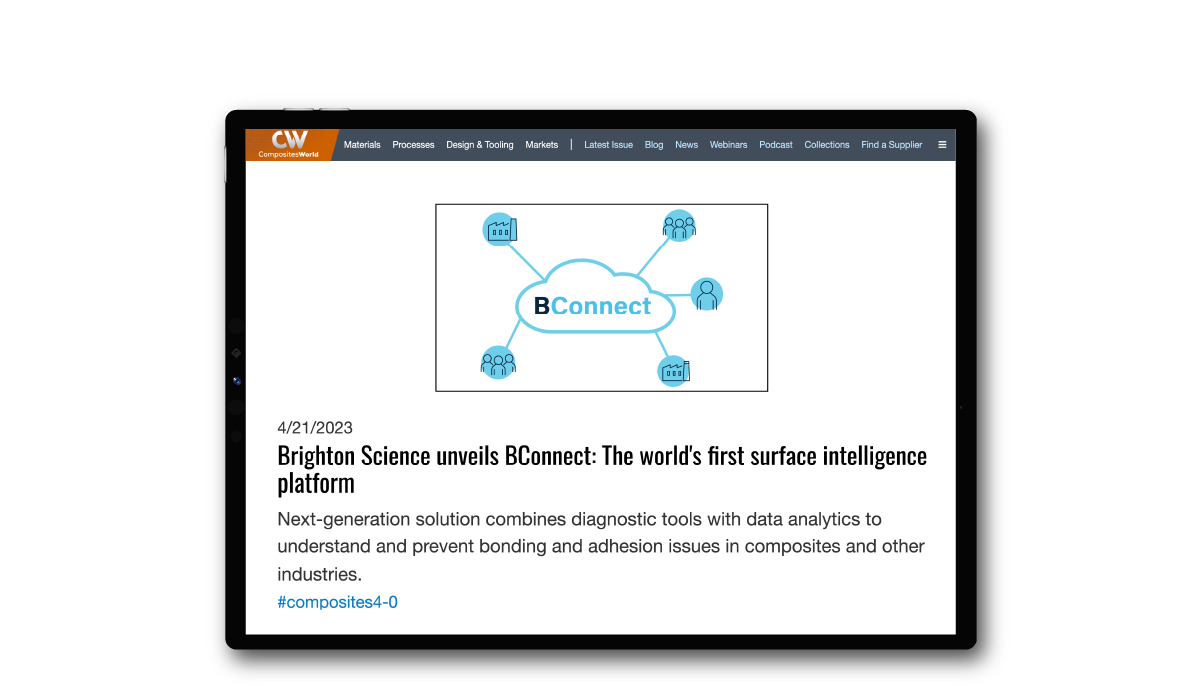Brighton Science, the global leader in surface intelligence, has announced the launch of the Silicone Detection Protocol, an innovative new feature integrated into the Process Monitor area of the BConnect platform. This innovative system combines nearly two decades of Brighton Science’s diagnostic expertise with the power of Process Monitor and BConnect, enabling manufacturers to detect changes in the atmosphere of their production environments that could compromise bonding and surface integrity.
“Silicone is an unavoidable reality in many manufacturing environments,” said Andy Reeher, CEO of Brighton Science. “While silicone obviously is part of every manufacturing environment, controlling where it goes in the production process protects painting, coating and sealing processes from being undermined by airborne silicone contamination. BConnect’s Silicone Detection Protocol gives manufacturers a method to monitor and detect atmospheric silicone ‘flares’ in the plant before they impact product quality.”
The Silicone Detection Protocol uses Brighton Science’s water contact angle measurement technology with witness trays at points throughout the plant to establish a baseline of normal environmental conditions and continuously monitors for deviations. The system provides real-time alerts, helping manufacturers prevent defects and maintain consistent product quality by identifying contamination early in the production process.
“We have used this technique for years in our consulting work to show customers why and where failures were happening. By integrating our Silicone Detection Protocol into BConnect, we’ve brought together a proven diagnostic technique with advanced monitoring technology,” said Reeher. “This ensures manufacturers can control their production environment with confidence and avoid costly adhesion failures.”
Key Features of the Silicone Detection Protocol:
- Baseline Establishment: Monitors initial surface energy levels to create a reference for ongoing assessments.
- Continuous Monitoring: Detects deviations from the established baseline, ensuring timely identification of contaminants.
- Immediate Alerts: Sends real-time notifications when contamination is detected, enabling rapid corrective actions.
- Benchmarking Power: Builds historic trend data and allows for comparisons over time and across plants.
- User-Friendly Integration: Seamlessly incorporated into existing BConnect systems, making monitoring and reporting easier than ever.
The Silicone Detection Protocol is available as part BConnect’s Process Monitor, adding even more ways to make measuring surface energy a KPI for quality teams.
“Silicone is hard to detect and isn’t easy to remove,” said Reeher. “It resists common cleaning methods, like plasma treatments, making it vital to detect it in the atmosphere before it settles on surfaces. The combination of Process Monitor and the Silicone Detection Protocol helps our customers manage their environment and to avoid shipping problematic parts.”
Brighton Science’s BConnect Platform is designed to extend surface energy measurement from the lab and into production. This hardware subscription delivers a superior customer experience and meets the needs for production-ready tools to assure predictable bonding.
BConnect combines a powerful measurement instrument with web-based tools to extend the flow of data throughout the enterprise. This software-as-a-service (SaaS) model continuously enhances customer value by providing ongoing improvements and new tools to boost quality and reduce costs. . The introduction of the Silicone Detection Protocol is an example of how the BConnect platform evolves, giving customers powerful tools to meet their surface quality needs and ensuring their manufacturing environments stay contaminant-free.
The Silicone Detection Protocol is now available to all BConnect subscribers for purchase.

_101625.png)

